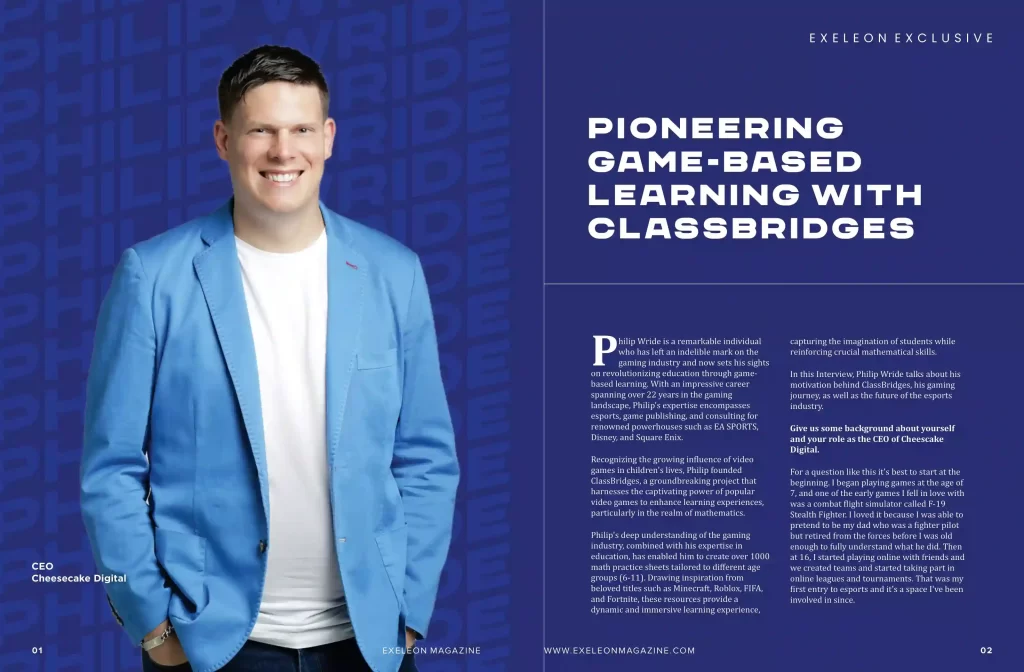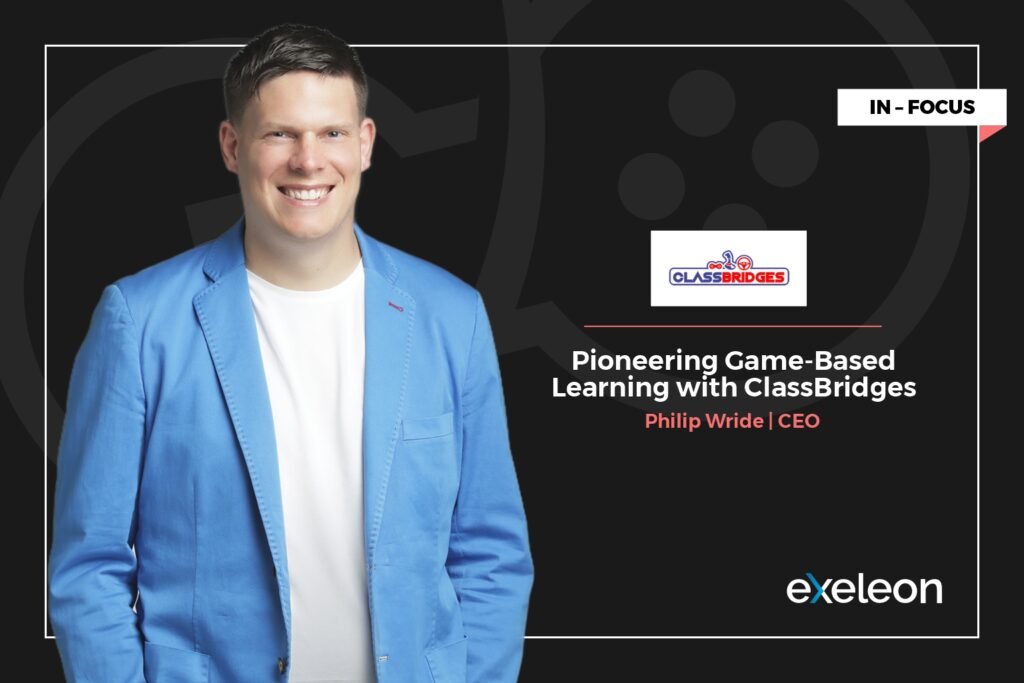Philip Wride is a remarkable individual who has left an indelible mark on the gaming industry and now sets his sights on revolutionizing education through game-based learning. With an impressive career spanning over 22 years in the gaming landscape, Philip’s expertise encompasses esports, game publishing, and consulting for renowned powerhouses such as EA SPORTS, Disney, and Square Enix.
Recognizing the growing influence of video games in children’s lives, Philip Wride founded ClassBridges, a groundbreaking project that harnesses the captivating power of popular video games to enhance learning experiences, particularly in the realm of mathematics.
Philip’s deep understanding of the gaming industry, combined with his expertise in education, has enabled him to create over 1000 math practice sheets tailored to different age groups (6-11). Drawing inspiration from beloved titles such as Minecraft, Roblox, FIFA, and Fortnite, these resources provide a dynamic and immersive learning experience, capturing the imagination of students while reinforcing crucial mathematical skills.
In this Interview, Philip Wride talks about his motivation behind ClassBridges, his gaming journey, as well as the future of the esports industry.
Give us some background about yourself and your role as the CEO of Cheescake Digital.
For a question like this it’s best to start at the beginning. I began playing games at the age of 7, and one of the early games I fell in love with was a combat flight simulator called F-19 Stealth Fighter. I loved it because I was able to pretend to be my dad who was a fighter pilot but retired from the forces before I was old enough to fully understand what he did. Then at 16, I started playing online with friends and we created teams and started taking part in online leagues and tournaments. That was my first entry to esports and it’s a space I’ve been involved in since.
I’ve now been involved in the games industry for over 22 years and have had the privilege to manage some of the world’s best esports teams, travel the world, consult for global brands and governments, and operate events.
My role as the CEO of Cheesecake Digital is to wear many hats – part cheerleader and business development, part strategist, project manager and consultant. Cheesecake Digital is a boutique company, wherein we build specialist project teams rather than have a large staff. I therefore get involved in a little bit of everything depending on the project or needs of the client.
Talk to us about ClassBridges and how the project aims at developing the math skills of children using videogames they love.
ClassBridges is a project I created during the pandemic. At the start of 2020, just before the pandemic started, I broke my neck playing rugby and didn’t get the surgery that was suggested. I let it heal naturally but the whole experience got me to question what I was doing and where I was going in life. Through some personal development there was a question about what would be said at my funeral and what impact I had made on the world and that got me thinking about how I could use my knowledge and experience of videogames to benefit people.
My partner is a teacher and one day she needed a math lesson for her students. I knew her whole class loved the game Among Us so we worked together to create a lesson plan and resources she could use the next day. From that I created the PARROT Framework which uses different parts of games, and different mechanics, and uses them as the basis for math questions.
ClassBridges focuses on using videogames to support learning and skill development with an emphasis on math. Some of the work we’ve done includes going into schools and hosting Minecraft competitions and coding workshops along with creating math practice worksheets based on different games. The mission is to use the power of videogames to develop the math skills of 1 million children.
What is your earliest memory or association with gaming?
At the age of 7, I started with an Atari ST. My dad brought it back from one of his trips abroad. By this time, he’d moved from being a fighter pilot to a commercial pilot and was regularly making trips from the UK to the US. There were a handful of games I remember including lemmings, rainbow islands, operation wolf, and the F-19 stealth fighter game I mentioned earlier.
What prompted your interest and subsequently your foray into the gaming and esports space?
I think this is really a combination of things – my love of gaming and the different experiences I was able to get through playing games whether that was saving the universe, completing puzzles, or working to progress to the next stage of a game was definitely a factor. Add in the competitive element of esports and the ability to play in structured competitions and it became the perfect combination.
I’ve always been competitive and played team sports growing up so esports was a natural extension to that. It also meant I didn’t have to fight against the rain and mud in my “normal” sports. At 16, I gained regional honors for rugby but didn’t pursue them because my gaming took over – I was progressing rapidly in the community I was part of and I was constantly experiencing new things. That definitely played a part in my focus on esports – it was always changing with new teams, competitions, and events to think about or participate in.

Although esports has been a booming industry with an ever-growing audience, there is a lot of skepticism surrounding the future of the industry. Where do you think the industry is headed towards?
We are in a correction phase. The money that has been pumped in has not yet returned the ROI and so new investors are more hesitant. The majority of revenue is still tied to sponsorship and advertising, and nobody has yet unlocked the revenue from the players and the fans. Merchandise and ticket sales are a small fraction of revenue compared with sponsorship and advertising and so esports needs to find a way to move game revenue from players and fans towards esports teams and events.
This is also where the game publishers and IP owners could do more. They already sit making a good amount of revenue and esports is often seen as nice to have rather than a valuable and core part of the overall community experience. If their view changes and they share more of the revenue with teams and event operators it will become a little easier for those involved to keep going. If we look at other traditional sports, there was always quite a long learning and growing curve and esports has skipped a few steps and is now having to do a mini reset.
I still think esports captures the imagination of fans and the spectacle is there, but the revenue is going to continue to be the key driver.
Having consulted some of the biggest game developers and publishers, coached esports entrepreneurs, and actively been involved with the industry for more than two decades, how do you look at your journey thus far?
I feel very blessed. When I first started playing Counter Strike online back in 2001, I obviously had no idea where the journey would take me. Looking back at the things I’ve been able to do because of gaming and esports is amazing. Yes, there have been some lows, projects and ideas that didn’t quite work, lost championships, and general business struggles but the experiences have definitely made up for those.
Finally, what would be your advice for new and emerging entrepreneurs in the esports space?
One piece of advice would be about service. How can they serve their customers in the best way possible. What does that look like and what does it enable their customers to do.
Another would be about acknowledging and embracing a level of uncertainty. In the way that I look at esports we are now entering the 6th age – the age of correction and consolidation. Before that we had the age of investment, the age of Twitch, the age of Championship Gaming Series and how it destroyed the US community for several years, the age of nation vs nation with the Esports World Cup and the World Cyber Games and before that the age of beginning. Each of them has brought uncertainty but also opportunity.
As entrepreneurs we are often driven by something and if we are working towards some goal or vision there will be an element of risk. This is the uncertainty I’m talking about. Esports doesn’t have a 100+ year history with everything ironed out and so new and emerging entrepreneurs need to acknowledge and embrace the rollercoaster.











